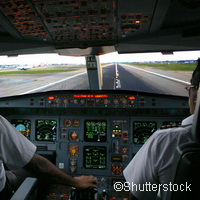New data communications to improve European airspace safety
Revolutionising aerospace communications could bring about significant improvements for aircraft in Europe's airspace. By using the latest innovative technology in air transportation, radical changes can be made to reduce the extra costs of fragmented airspace, estimated at EUR 5 billion each year. Current systems are unable to process and provide flight information in real time in European airspace. The processes and procedures do not provide the flexibility needed to meet growing demand, and new security requirements are affecting the ability to efficiently move people and cargo. These tools facilitating air transportation have already approached their limits. The United States, as an example for comparison, controls the same amount of airspace as Europe, but with more traffic, and at almost half the cost. Eradicating these problems is the sole aim of SANDRA ('Seamless aeronautical networking through integrations of data links, radios and antennas'), a new data link architecture who will provide the Air Transport transformation, ranging from concepts for Air Traffic Management to Next Generation IP Networks for passenger communications and in flight entertainment and infotainment. Co-funded by the European Commission under the Seventh Framework Programme for Research (FP7), this cutting-edge technology will help cope with the demand in aircraft operations, which is expected to at least double by 2025. With the new system in place, aircraft will have multiple data or voice links active simultaneously. These links will be available based on the geographical location and on the particular subset of communication systems deployed on board, which may vary from aircraft to aircraft. On a typical flight around the globe, the aircraft may utilise several link types provided by different providers to implement a large variety of services. Travellers will also reap the benefits, with reduced costs and delays, and improved efficiency, capacity, security and safety of their air transport system. Increasingly, there has been growing demand for mobile access to broadband networks while on board. So in response to this, several airlines are evaluating available technology that could see the reality of mobile use on board. Aviation is a sector that makes a vital contribution to the EU's overall economy and employment, supporting 5.1 million jobs and contributing EUR 365 billion, or 2.4 % to European gross domestic product (GDP). Global air transport over the long term is expected to grow by around 5 % annually until 2030. As traffic increases, so do concerns about safety, which is why the main aim of the EU aviation policy is to ensure Europe has the safest air space in the world. The integrated SANDRA will create a sustainable service ready to be commercially exploited by European airlines. This will in turn guarantee a service which is affordable for all passengers and service providers, using technology developed by European manufacturers. Test bed and in-flight trials are planned for SANDRA next May 2013 at the airports in Oberpfaffenhofen, Germany and Toulouse, France.For more information, please visit: SANDRA (Seamless aeronautical networking through integrations of data links, radios and antennas). http://www.sandra.aero/index.php European Commission - Mobility and Transport http://ec.europa.eu/transport/modes/air/index_en.htm



